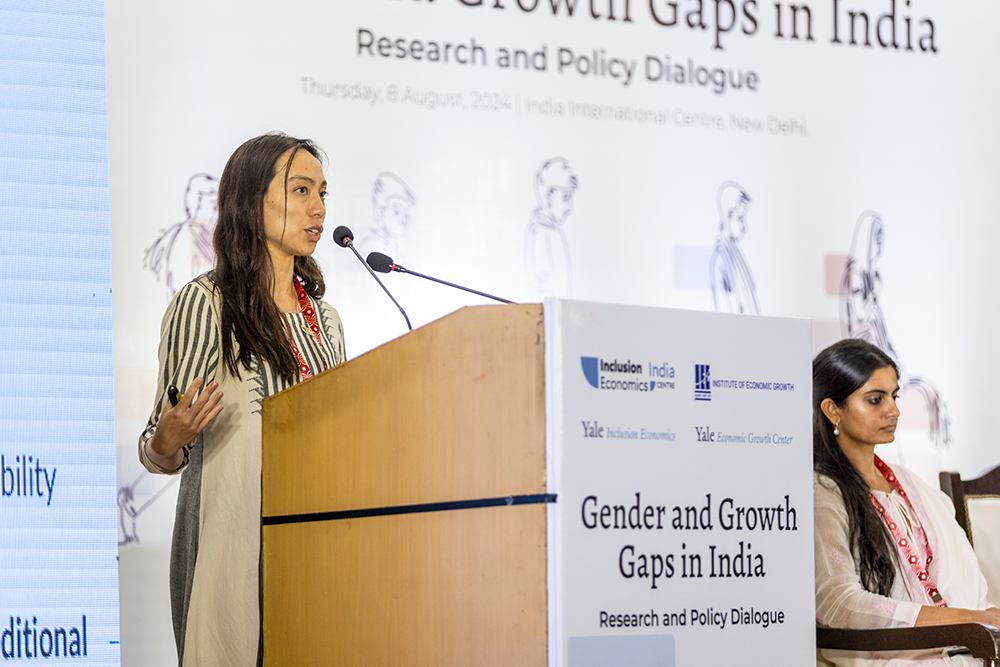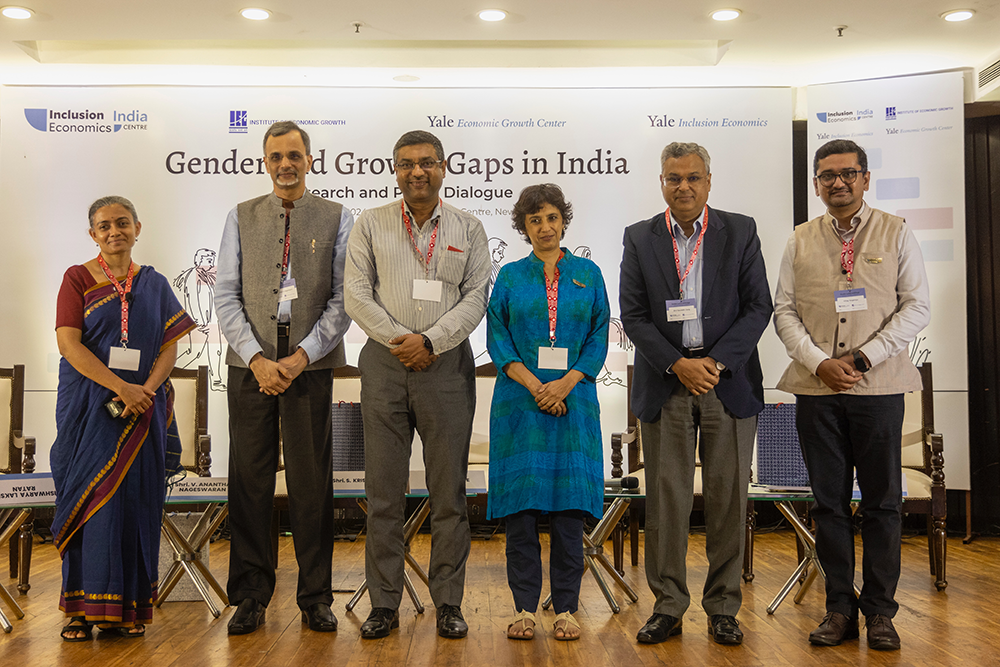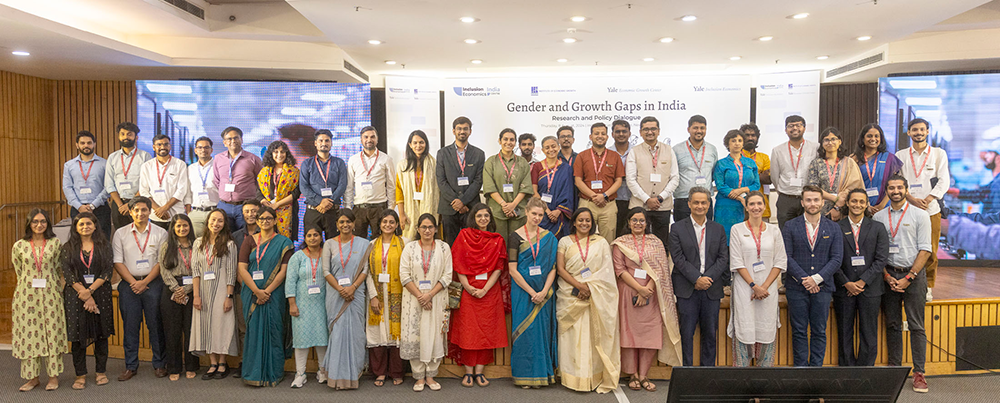Looking back on the "Gender and Growth Gaps in India" research and policy dialogue
What are the trends in women’s work in India and the underlying mechanisms that drive these trends? Yale Economic Growth Center, Inclusion Economics India Centre, Inclusion Economics at Yale University, and Institute of Economic Growth brought together researchers and high-level officials from the Government of India to answer these questions and more at a joint research and policy dialogue in New Delhi on Thursday, August 8, 2024.

On August 8, 2024, Yale Economic Growth Center (EGC), Inclusion Economics India Centre (IEIC), Inclusion Economics at Yale University (YIE), and Institute of Economic Growth (IEG) brought together over 160 members of the research and policy communities to discuss gender as a dominant friction in India’s labor markets, affecting the matching of talent with opportunity and the country’s development. EGC’s Gender and Growth Gaps Project comprises a crosscutting team of microeconomic and macroeconomic Yale researchers and collaborators who are interested in understanding trends in women’s work in India and the underlying mechanisms that drive these trends. This event provided a platform to share progress on this cutting edge research and hear how these findings interact with experiences of top officials from the Government of India.
Dr. Chetan Ghate (Director, IEG) and Dr. Rohini Pande (Director, Yale EGC) opened the day by discussing India’s impressive strides towards economic and financial inclusion. They described the great excitement about the potential for India to build its economy amidst the green transition and digital revolution. Alongside this enthusiasm about building an economy of the future, however, many questions remain about which policies can be leveraged to support inclusivity. Dr. Ghate commented that while economic surveys show gaps narrowed in some fields, they have widened in others. He provided specific details on a number of these gaps and noted that “investigating frictions in labor market is crucial.”
As the Government of India signals its commitment to women’s socioeconomic empowerment, increasing the gender budget by over one third, what evidence can we present to drive relevant policies to ensure these funds have the greatest impact? Rohini Pande said, “Our aim today is to discuss how we can bring microeconomic thinking and insights around gender gaps into looking at macroeconomic labor market outcomes."
From a global perspective to India-specific analysis, Pande and colleague Dr. Michael Peters (Yale) began the first session of the day by discussing how women’s economic outcomes have evolved alongside economic growth, and the implications of closing supply- and demand-side distortions in labor markets for economic development across Indian states through a proof-of-concept analysis of a Global Gender Distortions Index. While economic growth does not necessarily beget shrinking gender gaps, addressing these distortions could increase state-level productivity by up to 15 percent.
India’s structural transformation has been atypical, and its path forward will be further shaped by modern opportunities like the green transition and digital transformation – but how can women access and lead work in these ecological and digital spaces? Shri Naresh C. Saxena (Former Secretary, Planning Commission of India) discussed how India has sought to protect its 80.9 million hectares of forest, and the different ways that men and women rely on them for their livelihoods. In order for women’s needs to be reflected in forest management, Dr. Bina Agarwal (University of Manchester and IEG) discussed the importance of reaching a critical mass within the executive committees of community forest institutions in order to ensure that women not only attend, but actively participate and influence conservation outcomes. “Why do we expect women’s presence to have an impact?” Dr. Bina Agarwal said. “Women’s dependence on forests is different from, greater than, and more every day than men’s, and this creates gender differences in conservation outcomes ranging from stakes in forest conservation, ability to conserve, knowledge of ecosystems, and valuation of these ecosystems.”
Though community management has played a massive part in the nation’s forest conservation strategy, Pande highlighted the importance of understanding incentive structures for groups and collectives when designing payments for ecosystem services, as India taps into international climate finance to support forest conservation. “Some open questions remain: What role can common forest management groups & women play in this?” she said. “When you set up these systems at a community level, how effective are they? How do you design these incentive schemes to undertake conservation and ensure that these forests remain? It’s important to tie this to international climate finance and forest management in different ways.”

Yale Postdoctoral Associate Lisa Ho presents during the event.
India’s gig economy is large and ever-growing, and Dr. Suhani Jalota (Hoover Institute) discussed the transformative potential for women’s economic empowerment in a setting where, according to national time use data, over 70 percent of non-working women don’t leave their house at least once daily. Large and persistent digital gender gaps, however, threaten to replicate or exacerbate gaps in the analog labor market. Dr. Simone Schaner (University of Southern California and YIE) discussed how various social and economic factors intersect to inform whether or not a woman adopts digital technology and presented a framework to guide how we think about interventions that can promote meaningful access to, and use of, phones. Despite these challenges, Yale postdoctoral researcher Dr. Lisa Ho (YIE) presented research that shows how remote digital work can be not just an important income generation opportunity, but also an effective gateway to jobs outside the household.
The dialogue then hosted a policy panel with senior Government of India officials, including Dr. V. Anantha Nageswaran (Chief Economic Adviser), Shri S Krishnan, IAS (Secretary, Ministry of Electronics and Information Technology), and Dr. Saurabh Garg, IAS (Secretary, Ministry of Statistics and Programme Implementation), moderated by EGC Deputy Director Aishwarya Lakshmi Ratan. Panelists discussed India’s successes in closing the gender gap in education and promoting women’s studies in STEM fields, but even with these advances, women’s engagement in the labor force is still constrained by barriers including childcare, occupational norms including ‘greedy work’ and non-transparent rewards, and weak public infrastructure/support systems. The policy roundtable drove home the importance of partnership between researchers and policymakers in ensuring policy is evidence-backed, and that evidence is policy-relevant. Panelists emphasized that improving outcomes is an iterative process, and where one intervention may be successful without fully closing economic gaps, we need to revisit the theory of change and try new things.

Members of the policy panel following their session.
Dr. V. Anantha Nageswaran emphasized, “Bridging gender gaps in educational attainment is one aspect, but just because LFP gaps persist does not mean that education is useless. Once one particular aspect is addressed through policy, there need to be other complementary factors that need to be addressed. Changing the horizon & approach through which we look at the FLFP gap is probably equally important in addressing these gaps.” The panel also challenged researchers to support the government in developing innovative ways to capture and measure data, question which time horizons are realistic for evaluating effectiveness of policy in specific outcomes, advocate for what data would be most useful, and always share findings back where there are policy lessons. Shri S. Krishnan said, “Researchers have helped and continue to help state and national governments through designing and driving evidence-based policies and studying the efficacy of programs,” while Dr. Saurabh Garg shared, “Working with researchers is something that we do a lot, and it is always good to know what are the data gaps that serve a broader economic purpose that exist.”
Dr. Fabrizio Zilibotti (Yale University) closed the day by presenting district-level analysis of gender and labor market dynamics in India, presenting five mechanisms that could drive increased female labor participation and helping to situate many of the policy measures discussed throughout the day in broader context: (i) flexible formal work arrangements, (ii) safe public transportation in urban areas, (iii) reducing labor market discrimination, (iv) pushing for change in norms, and (v) economic growth.

Sign up here for our Towards Gender Equality newsletter to stay in the loop about updates related to the Gender and Growth Gaps project and other ongoing research promoting women’s social and economic empowerment.